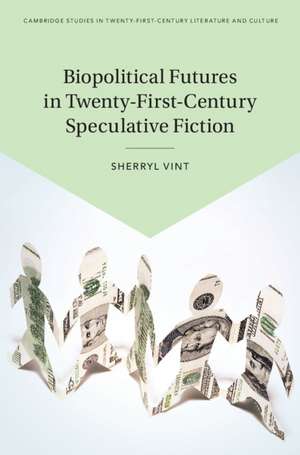Biopolitical Futures in Twenty-First-Century Speculative Fiction: Cambridge Studies in Twenty-First-Century Literature and Culture
Autor Sherryl Vinten Limba Engleză Hardback – 6 oct 2021
Preț: 274.22 lei
Nou
Puncte Express: 411
Preț estimativ în valută:
52.47€ • 56.11$ • 43.75£
52.47€ • 56.11$ • 43.75£
Carte disponibilă
Livrare economică 28 martie-11 aprilie
Livrare express 13-19 martie pentru 34.42 lei
Preluare comenzi: 021 569.72.76
Specificații
ISBN-13: 9781108839006
ISBN-10: 1108839002
Pagini: 280
Dimensiuni: 158 x 235 x 20 mm
Greutate: 0.5 kg
Editura: Cambridge University Press
Colecția Cambridge University Press
Seria Cambridge Studies in Twenty-First-Century Literature and Culture
Locul publicării:New York, United States
ISBN-10: 1108839002
Pagini: 280
Dimensiuni: 158 x 235 x 20 mm
Greutate: 0.5 kg
Editura: Cambridge University Press
Colecția Cambridge University Press
Seria Cambridge Studies in Twenty-First-Century Literature and Culture
Locul publicării:New York, United States
Cuprins
Introduction: neoliberalism and the reinvention of life; 1. Suspending death, reinventing life: the immortal vessel; 2. The new flesh: vital machines and reimagining the human; 3. Capital reproduction: maternity and productivity; 4. Surplus value: transplantation and fungible life; 5. Life industries: vitality as commodity; 6. Living to work: biocapital, synthetic biology, and the precaritization of labor; 7. Life optimized: pharmaceutical health and disposable bodies; 8. Surplus vitality and posthuman possibilities; Conclusion: capitalism, biopolitics, and a new body politic.
Notă biografică
Descriere
A theorization of how the bioeconomy and biotechnology remake 'life itself,' creating crises in ethics and governance.









